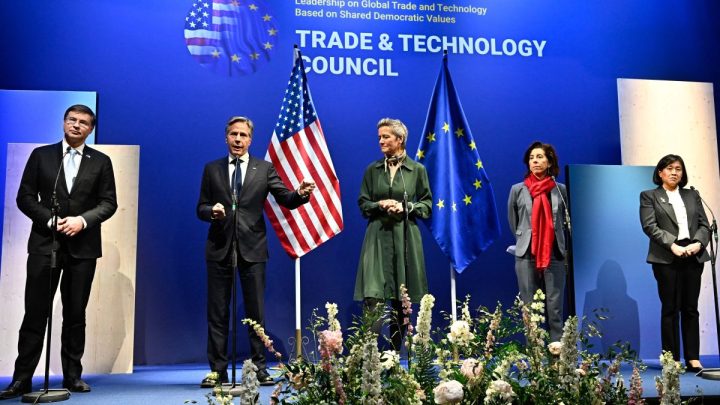
EU regulation of AI may yet impact U.S. consumers

Secretary of Commerce Gina Raimondo was in Sweden on Wednesday to chat trade and technology with her European Union counterparts. One big agenda item: artificial intelligence and how the world is going to regulate it.
Just like with other tech issues — think data privacy or antitrust — Europe is ahead of the United States on at least trying to set some rules around AI. And those rules could still end up impacting American consumers.
The EU parliament is already putting the final touches on the Artificial Intelligence Act, and it could become law within the next year.
“One thing there’s consensus on is that if you produce something that is a deep fake, something that people could think is real but isn’t, you have to label it and say, ‘This is AI,'” said Mark Brakel, policy director at The Future of Life Institute, which advocates for AI safety.
Creators of AI models, like the type that power ChatGPT, would also have to disclose whether they used copyrighted material to train their systems. Violators of the AI Act could face steep penalties, including fines of up to 4% of a company’s revenue.
Emphasis on the could.
“Enforcement is one of the key questions that are left open,” Brakel said.
Part of the reason the EU has moved so fast is that this AI legislation was actually introduced in 2021 to ban things like the use of AI in facial recognition software or emotion-recognition systems.
But Europe also historically has been quicker to regulate Big Tech, partly because of geography.
“A lot of the very largest online platforms that would be subject to this regulation are companies that are headquartered in the United States,” said Iverna McGowan with the Center for Democracy and Technology.
While the political influence of Silicon Valley may be an ocean away from Brussels, EU regulations can impact how American companies operate stateside.
“A lot of global companies, if they have to go to such effort to be compliant in Europe, it doesn’t really make sense to then have an alternative for different regions,” McGowan said.
In other words, if your company is required to watermark AI images in Germany, you might as well also watermark them in California.
There’s a lot happening in the world. Through it all, Marketplace is here for you.
You rely on Marketplace to break down the world’s events and tell you how it affects you in a fact-based, approachable way. We rely on your financial support to keep making that possible.
Your donation today powers the independent journalism that you rely on. For just $5/month, you can help sustain Marketplace so we can keep reporting on the things that matter to you.

















